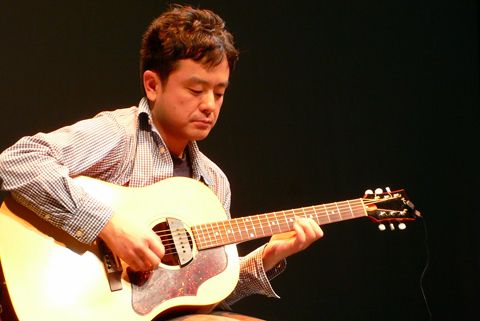Many guitarists tend to get carried away during solos — but Ken Ohtake (大竹研) knows when to play, and more importantly, when not to play. During a gig I did with him earlier this month, the Japanese guitarist displayed a knack for adding his own touch to a song without being overpowering.
Ohtake makes for an ideal backing guitarist, but he has another talent — composing — and tonight he presents his music in an informal concert at the Booday Shop on Nanjing West Road. Accompanying Ohtake on acoustic guitar: Chinese classical musician Chung Yu-feng (鍾玉鳳), who will play the pipa (琵琶) and accordionist Hsieh Chieh-ting (謝杰廷).
Many of Ohtake’s instrumental compositions have a cinematic feel. Simple melodies lead listeners through different moods and then develop into abstract themes, covering a wide range of tones and tempos.

PHOTO BY WU ZAOWAY, COURTESY OF TREES MUSIC AND ART
Like many musicians he hesitates to pin down his music: “It’s not jazz, it’s not pop, it’s not blues ... .” Yet Ohtake acknowledges these styles as the building blocks of his playing — in his early years, he studied jazz, and he cites guitarist Bill Frisell as an early influence.
“I hope my music will be something new for the audience but I also hope they will [feel] some nostalgia,” Ohtake says after a rehearsal last Monday. He says that for him personally, his music evokes his childhood, when he often “played outside until sunset.”
There is another sense of nostalgia in Ohtake’s music, inspired by his four-year musical apprenticeship with renowned Okinawan folk musician Takashi Hirayasu. Ohtake describes the first time he heard Hirayasu sing an Okinawan traditional: he had never heard the song before, but it felt very familiar. “I like this kind of emotion very much,” he says.
Hirayasu made such an impression that Ohtake scrapped his plans to attend the Berklee College of Music in Boston; instead, he stayed in Japan and served as Hirayasu’s backing guitarist. At the beginning, Ohtake imagines that they sounded “strange” to some, as he brought his jazz sensibilities to Okinawan folk music. “But this chemistry ... it’s my style,” he says, smiling.
Through Hirayasu, who performed in Taiwan several times between 2003 and 2006, Ohtake met Hakka singer-songwriter Lin Sheng-xiang (林生祥), with whom he has formed a close musical partnership, and Chung Yu-feng.
Chung, who teaches Chinese classical music at Fo Guang University (佛光大學), enjoys the “space and freedom” of Ohtake’s music. She said that she admired his “compositional abilities” and his ability to “take something difficult and make it easy to listen to.” Accordionist Hsieh Chieh-ting admires Ohtake’s sense of direction: “He’s very clear on what he wants to do.”
What Ohtake wants is to see where his music can go. Of working with Chung and Hsieh, he says, “there’s always a new discovery.” The two have brought a fresh perspective to Ohtake’s compositions: they have helped “to break my original image of [them] ... and this is good,” he says.
Tonight’s performance is Ohtake’s way of returning to his own “roots.” After playing with Hakka and Aboriginal musicians in Taiwan, he says, “sometimes I have to go back to my own place.”
“What I go back to is composition,” he says.

May 18 to May 24 Pastor Yang Hsu’s (楊煦) congregation was shocked upon seeing the land he chose to build his orphanage. It was surrounded by mountains on three sides, and the only way to access it was to cross a river by foot. The soil was poor due to runoff, and large rocks strewn across the plot prevented much from growing. In addition, there was no running water or electricity. But it was all Yang could afford. He and his Indigenous Atayal wife Lin Feng-ying (林鳳英) had already been caring for 24 orphans in their home, and they were in

President William Lai (賴清德) yesterday delivered an address marking the first anniversary of his presidency. In the speech, Lai affirmed Taiwan’s global role in technology, trade and security. He announced economic and national security initiatives, and emphasized democratic values and cross-party cooperation. The following is the full text of his speech: Yesterday, outside of Beida Elementary School in New Taipei City’s Sanxia District (三峽), there was a major traffic accident that, sadly, claimed several lives and resulted in multiple injuries. The Executive Yuan immediately formed a task force, and last night I personally visited the victims in hospital. Central government agencies and the

Australia’s ABC last week published a piece on the recall campaign. The article emphasized the divisions in Taiwanese society and blamed the recall for worsening them. It quotes a supporter of the Taiwan People’s Party (TPP) as saying “I’m 43 years old, born and raised here, and I’ve never seen the country this divided in my entire life.” Apparently, as an adult, she slept through the post-election violence in 2000 and 2004 by the Chinese Nationalist Party (KMT), the veiled coup threats by the military when Chen Shui-bian (陳水扁) became president, the 2006 Red Shirt protests against him ginned up by

As with most of northern Thailand’s Chinese Nationalist Party (KMT) settlements, the village of Arunothai was only given a Thai name once the Thai government began in the 1970s to assert control over the border region and initiate a decades-long process of political integration. The village’s original name, bestowed by its Yunnanese founders when they first settled the valley in the late 1960s, was a Chinese name, Dagudi (大谷地), which literally translates as “a place for threshing rice.” At that time, these village founders did not know how permanent their settlement would be. Most of Arunothai’s first generation were soldiers